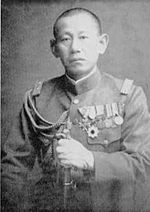- October Incident
-
The October Incident (十月事件 Jūgatsu Jiken), also known as the Imperial Colors Incident (錦旗革命事件 Kinki Kakumei Jiken), was an abortive coup d'état attempt in Japan, on 21 October 1931, launched by the Sakurakai secret society within the Imperial Japanese Army, aided by civilian ultranationalist groups.
Background and History
Having failed to replace the government with a totalitarian state socialist military dictatorship in the abortive coup d'etat of the March Incident of March 1931, Lieutenant Colonel Kingoro Hashimoto of the Sakurakai and his ultranationalist civilian supporters, including Shūmei Ōkawa resolved to try again in October 1931.
Soon after the Japanese invasion of Manchuria by the Kwantung Army without prior authorization from the Imperial Japanese Army General Staff Office and over the ongoing objections of the Japanese civilian government, Captain Isamu Chō returned secretly to Japan (without orders) from North China to lead the plot to “prevent the government from squandering the fruits of our victory in Manchuria” [1]. He was able to recruit the support of 120 members of the Sakurakai, ten companies of troops from the Imperial Guards and ten bomber aircraft from the Imperial Japanese Navy.
The main elements of the plot included:
- Key statesmen and officials such as Prime Minister Wakatsuki Reijirō, Grand Chamberlain Saitō Makoto, Prince Saionji Kinmochi, and Lord Keeper of the Privy Seal Makino Nobuaki, and Foreign Minister Kijūrō Shidehara were to be assassinated.
- The Imperial Palace, Tokyo Metropolitan Police Headquarters, and other key government buildings were to be seized by troops loyal to the Sakurakai
- A new cabinet would be formed under the auspices of General Sadao Araki, chief of the radical Imperial Way Faction. The new government would ban political parties, and would consolidate the recent territorial gains of Japan in Manchuria.
- The Emperor would be forced to accept this Shōwa Restoration even if under threat of physical violence [1]
However, younger elements within the conspiracy came to doubt their leaders and seceded from the plot. In addition there were leaks which reached War Minister, General Jirō Minami. The latter requested General Sadao Araki to pacify the malcontents. Araki there upon attempted to reason with Hashimoto and Chō, but they refused to abandon their scheme and Araki had them arrested by the Kempeitai on 17 October 1931.
The punishments for this abortive coup were even milder than for the previous the March Incident, as General Minami publicly excused the plot as simply an excess of patriotic zeal. Hashimoto was sentenced to 20 days house arrest, Chō to 10 days, and the other ringleaders were simply transferred.
Consequences
The October Incident, also known more elegantly as the "Imperial Colors Incident" thus ended in apparent failure, and resulted in the dissolution of the Sakurakai. However, the lightness of the punishments only encouraged more attempted military intervention in the government, cumulating with the February 26 Incident of 1936. [2]
References
Categories:- Conflicts in 1931
- 1931 in Japan
- Empire of Japan
- Rebellions in Japan
- Attempted coups
- Military coups in Japan
Wikimedia Foundation. 2010.

